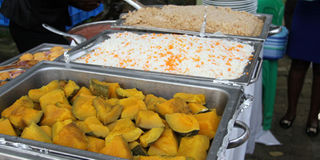Tourism opportunities Ugandans can take economic advantage of

Some of Uganda’s local foods. Food is a major factor that influences a tourist’s choice of their next destination. FILE PHOTO
What you need to know:
For ordinary Ugandans interested in investing in the country’s tourism sector, there are broad areas where you can put your money and energy. James Abola writes.
Uganda has great tourism potential and a few mature tourism businesses. According to the World Travel and Tourism Council, tourism & travel has made great contributions to Uganda’s economy.
In 2014, the total contribution of tourism & travel to employment, including jobs indirectly supported by the industry, was 8.6 per cent of total employment that stood at 592,500 jobs. This was expected to rise by 5.5 per cent in 2015 to 625,500 jobs and then by 3.9 per cent per annum to 921,000 jobs in 2025 – making it 8.9 per cent of total.
When the tourism industry for Kenya, Tanzania and Uganda are pooled together, Uganda accounts for only 6.9 per cent.
If you wanted to invest in Uganda’s tourism sector below are broad areas where you can put your money and energy.
Tour personnel
Good quality operational and managerial personnel are in short supply and this provides opportunities to offer training in skills such as tour guide, hotel and catering, planning and booking travels. At the moment the typical untrained Ugandan driver will pick up a visitor from Entebbe and drive in a near silence all the way to the hotel in Kampala, all the while thinking that the interesting tour sites are perhaps in a game park or at the source of the Nile in Jinja and yet Entebbe International Airport and its surroundings have a lot of interesting history.
Transportation
International tourists require air transport services. Uganda is very weak in the area of air transport and relies on international carriers such as Emirates and Qatar Airways and regional carriers such as RwandAir and Kenya Airways which make all flights go through their countries instead of flying directly to Uganda. Local air transport is also not well developed. The cheaper opportunities lie in the provision of appropriate road transport services. One of the low hanging fruits in transportation which would appeal to city tourists is the introduction of tuktuks (because of their convenience and shade they provide) to replace taxis and boda bodas.
Accommodation
While the number of hotel rooms, in and around Kampala, has grown tremendously, there is still a big shortfall of quality accommodation in upcountry towns and tourism destinations. The many Kampalans who keep their village and home town houses locked for 11 months in a year could earn some income if they turned these facilities into bed and breakfast inns.
Food and drinks
Tourists need to eat and drink. Uganda has very rich local food variety which we do not promote well enough. For instance, it is a shame that a person can find it difficult to order for Malakwang or Malewa from the top restaurants in Kampala. By failing to promote local food we play into the hands of those who are able to prepare better European or Chinese or Indian food.
Infotainment
Information and entertainment are key elements of the experience of the tourist. Our competitive advantage as a country lies in the rich culture, history and biodiversity of Uganda.
Value
Tourism contribution to the economy.
The total contribution of tourism and travel to Gross Domestic Product (GDP) was Shs6, 395.4b, a translation of 9.9 per cent of GDP in 2014, and was forecast to rise by 8 per cent in 2015 and by 6.6 per cent per annum to Shs13, 083.2b in 2025. This would make it 10.2 per cent of GDP. But when the tourism industry for Kenya, Tanzania and Uganda are put in a common pool, Uganda accounts for only 6.9 per cent.




